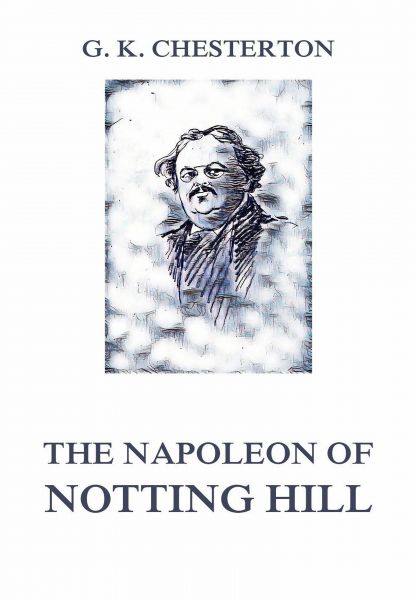The Napoleon of Notting Hill
Mad, perfectly mad, madder than the immortal tea-party of Alice, is the thought while reading this novel, or satire, or caricature, or allegory, or farce, or joke, or whatever it is, which Mr. Chesterton has published. When you have finished reading the book, you lay it down and positively gasp, your brain whirls and you stagger with the question whether you have been reading a book, or dreaming a dream. You feel of the book, find it there — very substantial, and then you wonder whether you or the writer is mad: it must be one or the other. Then you remember that Mr. Chesterton is a perfectly sane man, a writer of great ability and much distinction. Then you also remember that Lewis Carroll was a mathematician, and you realize that no madman can write entertaining madness, and you come to the conclusion that it is you who lack the key. Then you think it all over; and you not only do not find the key, but you do not even find the keyhole. You ask someone else about it; he says no one has found the key, — not the best searchers. You finally decide that there is no key, and no keyhole, that the whole tiling is just a nebulous mass of gas — laughing-gas, to be taken as an antidote for the pain of modern life and the dullness of fiction. A humorous and satirical tale of English politics. While an intimate knowledge of the ins and outs of the British policies and shibboleths of the day is required to appreciate all the author's points, yet the story will interest those who love the odd and unusual.
English journalist and author, who came of a family of estate-agents, was born in London on the 29th of May 1874. He was educated at St Paul's school, which he left in 1891 with the idea of studying art. But his natural bent was literary, and he devoted himself mainly to cultivating that means of expression, both in prose and verse; he did occasional reviewing, and had some experience in a publisher's office. In 1900, having already produced a volume of clever poems, The Wild Knight, he definitely took to journalism as a career, and became a regular contributor of signed articles to the Liberal journals, the Speaker and Daily News. He established himself from the first as a writer with a distinct personality, combative to a swashbuckling degree, unconventional and dogmatic; and the republication of much of his work in a series of volumes (e.g. Twelve Types, Heretics, Orthodoxy), characterized by much acuteness of criticism, a pungent style, and the capacity of laying down the law with unflagging impetuosity and humour, enhanced his reputation. His powers as a writer are best shown in his studies of Browning (in the "English Men of Letters " series) and of Dickens; but these were only rather more ambitious essays among a medley of characteristic utterances, ranging from fiction (including The Napoleon of Notting Hill) to fugitive verse, and from artistic criticism to discussions of ethics and religion.
Versandkostenfreie Lieferung! (eBook-Download)
Als Sofort-Download verfügbar
- Artikel-Nr.: SW9783849650018
- Artikelnummer SW9783849650018
-
Autor
Gilbert Keith Chesterton
- Wasserzeichen ja
- Verlag Jazzybee Verlag
- Seitenzahl 248
- Veröffentlichung 11.08.2017
- ISBN 9783849650018
- Wasserzeichen ja

